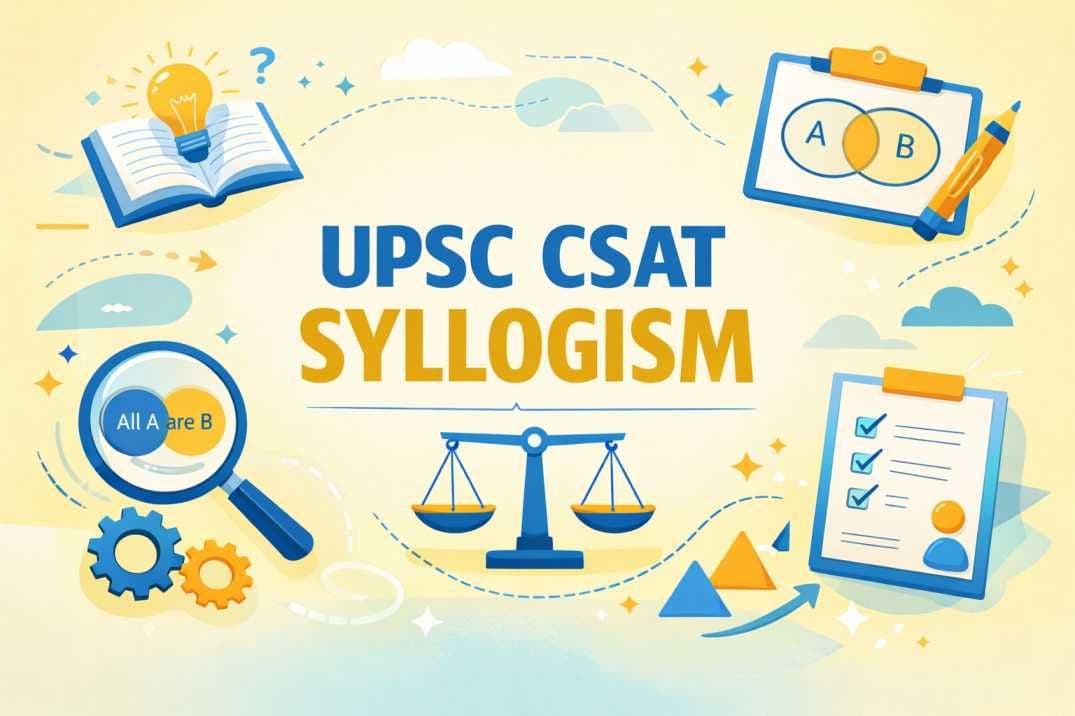UPSC Governance Syllabus: Complete Guide with Preparation Tips
Sep, 2025
•4 min read
Governance is a vital part of the UPSC syllabus. It forms a major section of General Studies Paper II in Mains and is also integrated within the Polity portion of Prelims. This subject evaluates a candidate’s understanding of how the government functions, formulates and implements policies, and ensures effective administration.
In this blog, we will cover the complete Governance syllabus for UPSC Prelims and Mains, along with preparation tips and key focus areas.
Why Studying Governance is Important for UPSC
Governance plays a central role in the UPSC exam because it reflects how policies and institutions impact people’s lives. For an IAS officer, understanding governance is important for applying concepts to real administrative challenges.
- In Prelims, governance is integrated with Polity, helping aspirants connect constitutional provisions with current affairs.
- In Mains (GS Paper II), it becomes a core area where candidates are tested on policy-making, transparency, accountability, e-governance, and citizen-centric administration.
- Many Essay Paper and Ethics Paper (GS IV) questions also draw on governance-related themes, making it a high-value area for overall preparation.
UPSC Mains Complete Governance Syllabus
The governance syllabus tests knowledge of India’s administrative framework, institutional mechanisms, and policy processes.
- Constitutional principles: Preamble, Federalism, Amendments
- Separation of powers: Legislature, Executive, Judiciary
- Institutional frameworks: NITI Aayog, NHRC, CIC, CAG, Election Commission
- Key laws: RTI Act, Lokpal & Lokayuktas, Citizens’ Charters
- Transparency & accountability: Audit, whistleblower protection
- E-governance: Models, applications, challenges
- Public policy: Formulation, implementation, evaluation
- Role of civil services: Ethics, integrity, probity
- Grassroots governance: Panchayati Raj, Municipalities
- Stakeholders: NGOs, SHGs, community participation
Each topic above will be tested through both factual questions (Prelims) and analytical questions (Mains). For example, GS-II may ask to discuss transparency and accountability measures in India’s governance.
UPSC Governance Preparation Strategy by Toppers
Covering the governance syllabus for UPSC requires smart study, analytical clarity, and answer-writing practice. Toppers emphasise a mix of standard resources, structured revision, and strong current affairs integration. Here’s a strategy that has worked for many successful candidates:
1. Master the Syllabus
- Break down governance into key areas: Constitutional provisions, public administration theories, policy processes, and governance models.
- Map each sub-topic with previous year questions (PYQs) to identify recurring themes.
2. Use Standard Texts + Toppers’ Notes
- Start with M. Laxmikanth for constitutional and polity basics.
- For administrative theories, refer to Peters’ “The Politics of Bureaucracy.”
- Supplement with toppers’ handwritten notes and curated summaries for concise revision.
3. Practice Regular Answer Writing
- Write at least one timed answer per topic weekly.
- Focus on analytical depth, case studies, and real-world examples as demanded in UPSC Mains.
- Self-evaluate using UPSC’s model answers and topper copies.
4. Follow Policy Newspapers & Reports
- Read The Hindu editorials, PRS reports, and NITI Aayog documents for policy updates.
- Maintain short notes on government schemes and reforms, linking them with governance concepts.
5. Interlink with Current Affairs
- For every governance topic, connect it with contemporary examples: Decentralisation → Panchayati Raj updates, E-Governance → Digital India, e-Office, JAM Trinity, Transparency → RTI implementation cases.
6. Revise with Mind Maps
Create visual mind maps for core topics like separation of powers, administrative ethics, and accountability mechanisms.
Helps in faster recall and structured presentation in the Mains.
7. Study Model Answers & Insights
Analyse toppers’ answer sheets to learn presentation, introductions, and conclusions.
Use UPSC’s official model answers for clarity on what examiners expect.
8. Integrate Ethics with Governance
Many governance issues overlap with Ethics (GS-IV).
Solve case studies on accountability, transparency, and integrity to strengthen interdisciplinary connections.
Topper’s Tip: Governance is about writing answers that combine concepts, current examples, and practical insights. Make your preparation dynamic, not static.
Practice UPSC Mains PYQs — Only on SuperKalam!
Get access to UPSC Mains PYQs with model answers. Practice with instant Mains answer evaluation & smart diagrams, all in one place.
Start Practicing NowTopper’s Recommended Books for UPSC Governance
Choosing the right books ensures conceptual clarity and authoritative coverage of governance topics. Here are the standard books you should read for effective preparation:
These books are widely recommended by past UPSC toppers and cover the complete governance topics of the UPSC official syllabus.
Conclusion
A clear grasp of the UPSC Governance Syllabus with targeted strategies for Prelims and Mains and the right study materials will help you to master governance. Consistent revision, practice questions, and integration of real-world examples are necessary to boost your scores.
Want to Level Up Your UPSC Prep?
Join SuperKalam – India’s smartest AI-powered personal mentor, keeping your preparation disciplined, focused, and effective with:
Instant Mains Answer Evaluation
Instant doubt resolution
Personalised guidance
Unlimited MCQs and PYQs
Progress tracking through daily goals, streaks, and leaderboards.
Download SuperKalam App Now: SuperKalam Crack UPSC IAS


